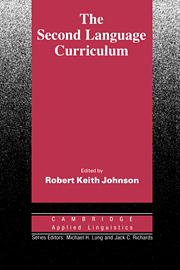Book contents
- Frontmatter
- Contents
- Contributors
- Series editors' preface
- Acknowledgements
- Overview
- I 1 CURRICULUM OVERVIEW
- I 2 CURRICULUM PLANNING
- II ENDS/MEANS SPECIFICATION
- Chapter 4 Needs assessment in language programming: from theory to practice
- Chapter 5 The role of needs analysis in adult ESL programme design
- Chapter 6 Service English programme design and opportunity cost
- III PROGRAMME IMPLEMENTATION
- IV CLASSROOM IMPLEMENTATION
- V EVALUATION
- Bibliography
- Index
Chapter 5 - The role of needs analysis in adult ESL programme design
Published online by Cambridge University Press: 05 October 2012
- Frontmatter
- Contents
- Contributors
- Series editors' preface
- Acknowledgements
- Overview
- I 1 CURRICULUM OVERVIEW
- I 2 CURRICULUM PLANNING
- II ENDS/MEANS SPECIFICATION
- Chapter 4 Needs assessment in language programming: from theory to practice
- Chapter 5 The role of needs analysis in adult ESL programme design
- Chapter 6 Service English programme design and opportunity cost
- III PROGRAMME IMPLEMENTATION
- IV CLASSROOM IMPLEMENTATION
- V EVALUATION
- Bibliography
- Index
Summary
Introduction
One of the fundamental principles underlying learner-centred systems of language learning is that teaching/learning programmes should be responsive to learners' needs. It is now widely accepted as a principle of programme design that needs analysis is a vital prerequisite to the specification of language learning objectives.
Over recent years, however, there has been a good deal of disagreement in ELT circles over the meaning of ‘needs’ and what ‘needs analysis’ should entail. This disagreement has resulted in the emergence of two orientations to needs analysis. The first of these is based on what could be termed the ‘narrow’ or ‘product-oriented’ interpretation of needs whereby the learners' needs are seen solely in terms of the language they will have to use in a particular communication situation. Needs analysis therefore becomes a process of finding out as much as possible before learning begins about the learners' current and future language use. On the other hand, proponents of the second interpretation of needs, which I will call the ‘broad’ or ‘process-oriented’ interpretation, see needs primarily in terms of the needs of the learner as an individual in the learning situation. If this view of needs is adopted, then needs analysis means much more than the definition of target language behaviour: it means trying to identify and take into account a multiplicity of affective and cognitive variables which affect learning, such as learners’ attitudes, motivation, awareness, personality, wants, expectations and learning styles.
- Type
- Chapter
- Information
- The Second Language Curriculum , pp. 63 - 78Publisher: Cambridge University PressPrint publication year: 1989
- 51
- Cited by



